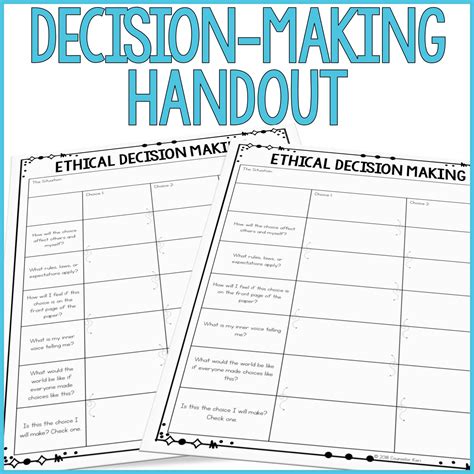Making decisions that align with our personal and professional values is crucial in today's fast-paced world. Ethics play a significant role in decision-making, as they help us differentiate between right and wrong. In this article, we will explore the importance of applying ethics in decision-making and provide a comprehensive guide on how to do so using an application worksheet.
Why Ethics Matter in Decision Making
Ethics are the moral principles that guide our behavior and decision-making. They help us determine what is right and wrong, and ensure that our actions align with our values and principles. In decision-making, ethics play a crucial role in ensuring that our choices are fair, just, and respectful of all stakeholders involved.
Benefits of Applying Ethics in Decision Making
Applying ethics in decision-making has numerous benefits, including:
- Increased trust: When we make decisions that are guided by ethics, we build trust with our stakeholders, including colleagues, customers, and partners.
- Improved reputation: Ethical decision-making helps to establish a positive reputation and enhances our credibility in the marketplace.
- Better outcomes: Ethical decision-making leads to better outcomes, as it takes into account the well-being of all stakeholders involved.
- Personal growth: Applying ethics in decision-making helps us develop our critical thinking skills and become more self-aware.
The Decision-Making Process
The decision-making process involves several steps, including:
- Identify the problem: Clearly define the problem or opportunity that requires a decision.
- Gather information: Collect relevant data and information to inform the decision.
- Evaluate options: Weigh the pros and cons of each option and consider the potential consequences.
- Choose a course of action: Select the best option based on the evaluation.
- Implement the decision: Put the chosen option into action.
Applying Ethics in Decision Making
To apply ethics in decision-making, we need to consider the following principles:
- Respect for autonomy: Respect the rights and dignity of all individuals involved.
- Non-maleficence: Do no harm to others.
- Beneficence: Act in the best interests of others.
- Justice: Ensure that the decision is fair and just.
Application Worksheet
To help you apply ethics in decision-making, we have created a comprehensive worksheet that guides you through the decision-making process.

Step 1: Identify the Problem
- What is the problem or opportunity that requires a decision?
- Who are the stakeholders involved?
Step 2: Gather Information
- What are the key facts and data related to the problem?
- What are the potential consequences of each option?
Step 3: Evaluate Options
- What are the pros and cons of each option?
- How do the options align with our values and principles?
Step 4: Choose a Course of Action
- Which option is the best choice based on the evaluation?
- How will the decision impact the stakeholders involved?
Step 5: Implement the Decision
- What steps need to be taken to implement the decision?
- How will the decision be communicated to the stakeholders involved?
Gallery of Decision Making






FAQs
What is the importance of ethics in decision-making?
+Ethics play a crucial role in decision-making as they help us differentiate between right and wrong and ensure that our actions align with our values and principles.
How do I apply ethics in decision-making?
+To apply ethics in decision-making, consider the principles of respect for autonomy, non-maleficence, beneficence, and justice. Use the decision-making worksheet to guide you through the process.
What are the benefits of applying ethics in decision-making?
+The benefits of applying ethics in decision-making include increased trust, improved reputation, better outcomes, and personal growth.
Conclusion
Applying ethics in decision-making is crucial in today's fast-paced world. By considering the principles of respect for autonomy, non-maleficence, beneficence, and justice, we can make decisions that align with our values and principles. The decision-making worksheet provides a comprehensive guide to help you apply ethics in decision-making. Remember, ethics matter in decision-making, and by applying them, we can build trust, improve our reputation, and achieve better outcomes.
